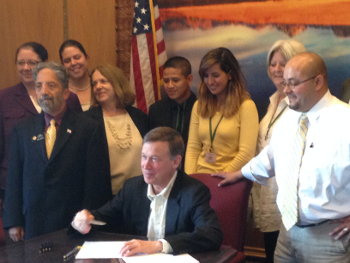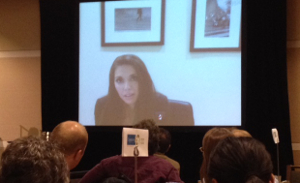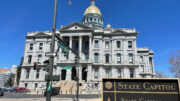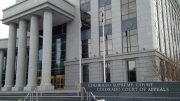By Jeffrey A. Roberts
CFOIC Executive Director
Fees for public records, protecting the confidential sources of journalists, the Open Meetings Law.
These weren’t the topics that grabbed the most headlines during the 2014 legislative session, which ended Wednesday. But that doesn’t diminish their importance.
The CFOIC followed 21 bills with the potential to affect the availability or flow of information in Colorado. (For details on any or all of them, see the BillTrack50 widget on CFOIC’s Legislature page.) For those of us concerned about government transparency, there were more winners than losers this year, although some successful bills still await action by Gov. John Hickenlooper.
“The legislature did good work on open government issues in 2014,” said lobbyist Greg Romberg, who represents the Colorado Press Association and Colorado Broadcasters Association. “Passage of HB 1193 ensures that research and retrieval fees (for public records) will be kept in check. Bills to address privacy concerns on passive surveillance and mug shots were done in ways that preserve public access to government records, and the legislature acted quickly to overturn a terrible district court decision to limit the public’s right to challenge open meetings violations.”
CORA research-and-retrieval fees
Clearly, HB 14-1193 was the centerpiece of this session’s freedom-of-information legislation. Romberg worked for months to broker a deal on the cost of open records, convening multiple meetings of stakeholders representing both governments and frequent requesters of information (including the news and civic organizations that are members of CFOIC).
Talks fell apart last fall, but a subgroup kept working on a compromise as did Rep. Joe Salazar, D-Thornton, and Sen. John Kefalas, D-Fort Collins. The two lawmakers went ahead with a bill that changed several times during the session but ultimately, and for the first time, set statewide standards for what state and local government agencies may charge to research and compile records covered under the Colorado Open Records Act (CORA).

Gov. John Hickenlooper signs HB 14-1193 flanked by (left) Sen. John Kefalas, D-Fort Collins, and (right) Rep. Joe Salazar, D-Thornton
Starting July 1, governments that now set their own fees (with judicial guidance that many consider to be vague) will be allowed to charge no more than $30 per hour to fill records requests. The first hour must be provided at no cost, and no charges will be allowed unless fee policies are first posted on the Internet or in some other form.
The hope is that HB 14-1193 (signed by Hickenlooper on May 2) will bring some certainty and uniformity to public records fees that now are “all over the map,” as a 2013 Colorado Ethics Watch study found. It remains to be seen whether some governments that currently charge less than $30 per hour and provide two hours for free will switch to the maximum-allowable rate.
Challenging Sunshine Law violations
Before the session began, nobody expected the General Assembly to enact a major clarification of Colorado’s Open Meetings Law, also known as the Sunshine Law. But HB 14-1390 became necessary at the end of March, when a Jefferson County District Court judge dismissed a citizen’s lawsuit against Arvada for allegedly violating a 2012 ban on the use of secret ballots.
The judge said the Arvada City Council “may have violated the secret ballot provision” when it marked unsigned sheets of paper four times Jan. 10 to eliminate candidates for a vacant council seat. But she ruled against Arvada resident Russell Weisfield because he couldn’t prove he had been personally harmed by the council’s hidden votes.
The surprise ruling, which The Gazette in Colorado Springs called “obnoxious and dangerous,” threatened to make the Sunshine Law “a dead letter” in the words of CFOIC President Steve Zansberg. But the legislature took care of that by explicitly stating that anyone has legal standing to challenge violations of the Open Meetings Law.
Introduced late in the session, HB 14-1390 zipped through the legislative process with no opposition and awaits the governor’s signature.
School board executive sessions
HB 14-1110 and SB 14-182 were among the most controversial – and politically charged – transparency bills of the session. Both were introduced in response to a perception that some boards of education have held secret meetings in violation of the Sunshine Law.
The House bill died in the Senate with opposition coming from lawyer lawmakers up in arms about a provision requiring the electronic recording of all portions of school board executive sessions, including attorney-client discussions. Keeping the recorder going would chill those privileged conversations, they argued, even though a judge’s OK would have been necessary to release any recordings to the public.
The Senate bill, dubbed a “Mini-Me” version of HB 14-1110 by sponsoring Rep. Cherylin Peniston, D-Westminster, merely adds the requirement that executive session minutes reflect the amount of time spent discussing each topic, in addition to a broad description of each topic as required under current law. The House re-passed SB 14-182 on the last day of the session, agreeing to Senate language stating that any electronic recordings of school board executive sessions must be kept for at least 90 days.
Journalist shield law
Sen. Bernie Herpin, a Colorado Springs Republican who came to the legislature via a recall election last year, was so moved by the plight of Fox News reporter Jana Winter that he made strengthening Colorado’s journalist shield law his first priority as a state lawmaker.

Speaking to the Colorado Press Association convention via Skype, Fox News reporter Jana Winter asks lawmakers to reconsider shield law bill.
Winter faced the possibility of jail time for failing to reveal her sources for an article about a notebook that James Holmes mailed to his psychiatrist before the Aurora movie theater shooting in July 2012. Because the story was based on information told to Winter in confidence by law enforcement sources, attorneys for Holmes subpoenaed the New York-based reporter to testify in Colorado, saying the unidentified officers had violated a judge’s gag order.
SB 14-034, as introduced, would have made Colorado’s shield law more like New York’s, giving journalists here the same absolute protection against being compelled to reveal confidential sources and unreported information. Herpin agreed to a weaker version of the bill before it died in the Senate Judiciary Committee in late January.
Transportation transparency
Public outcry over the handling of the Boulder Turnpike toll-lane expansion project led to SB 14-197, which was sent to the governor earlier this week. Residents complained that they didn’t find out about key details of a 50-year agreement between the Colorado Department of Transportation and an Australian-based company until the project’s final planning stages.
For future public-private transportation projects, the bi-partisan bill is intended to give the public more information and more opportunities to weigh in. It also would require more communication with state legislators, and any deal longer than 35 years would need the General Assembly’s OK.
School spending transparency
HB 14-1292, one of two major school-finance bills approved late in the session, includes $3 million for the creation of a website with searchable information about school and school district spending in “a format that is readable by a layperson.” The website is supposed to be up by July 1, 2017.
Mug shots for profit
HB 14-1047, which Hickenlooper signed Apr. 11, is aimed at Internet sites that publish booking photos and then charge people to take them down.
Under the new law, which takes effect Sept. 1, obtaining an arrest mug shot with the intention of posting it online and charging a fee to remove it would be a misdemeanor punishable by a fine of up to $1,000. The status of mug shots as public records is not affected, but news organizations and others who request booking photos from law enforcement agencies must promise in writing not to violate the law.
Passive surveillance images
HB 14-1152, signed by Hickenlooper on Apr. 4, mandates the purging of most images captured by government cameras after three years. Access to the images is restricted after the first year unless they are shown to be needed as evidence in felony criminal proceedings or in civil, labor or administrative proceedings.
The privacy legislation includes passive surveillance images taken by photo radar cameras, license plate readers and HALO street cameras operated by police. Images currently available under public records laws – before restrictions kick in a year after an image is created – would continue to be available.
Identity theft
HB 14-1073 and HB 14-1112, both of which were signed by Hickenlooper, are aimed at curbing identity theft from public documents. HB 14-1073 closes marriage and civil union license applications that now become public records after 50 years. The applications may contain personal information such as Social Security number, mother’s maiden name and date of birth. HB 14-1112 requires county clerks to redact the first five digits of a Social Security number on an electronic copy of a public document, if a person makes a request.
Remote testimony on state legislation
HB 14-1303, re-passed by the House last week, is an overdue measure that will let Colorado residents who live far from the state Capitol testify on proposed legislation using conferencing technology. The remote sites, to be introduced in phases, most likely would be at state colleges and universities. At least one site would be on the Western Slope.
Lobbyist disclosure
SB 14-217, which won final passage on the last day of the session, establishes new disclosure rules for lobbyists, including a requirement that professional lobbyists list other lobbyists they work for as subcontractors.
Sealing pot records
Introduced a week before the session ended, SB 14-218 didn’t last long. The bill would have eased the process for sealing the records of marijuana crimes now legal in Colorado under Amendment 64.
It was intended to help people who have trouble getting jobs, loans and housing because their records reveal minor marijuana convictions. But opponents said laws already on the books allow for the sealing of petty-offense convictions. Others said the proposal should be studied more thoroughly over the summer.
SB 14-129, which was successful and awaits action by the governor, automatically seals the first-offense records of minors charged with pot use or possession after a deferred judgment, payment of a fine or completion of substance abuse education. Offenders may petition a court to seal records of subsequent offenses.
Private association records
SB 14-070 died a quick death early in the session. The bill would have opened records kept by private associations that have memberships consisting primarily of state or local elected officials and collect at least 10 percent of their annual revenues from “public moneys.”
Meetings of new health-care commission
SB 187, sent to the governor last week, creates a new commission to study and make recommendations for controlling health-care costs. Up to five of the commission’s 12 members could meet to review data without having to comply with the Open Meetings Law.
Follow the Colorado Freedom of Information Coalition on Twitter @CoFOIC. Like CFOIC’s Facebook page. Do you appreciate the information and resources provided by CFOIC? Please consider making a tax-deductible donation.




